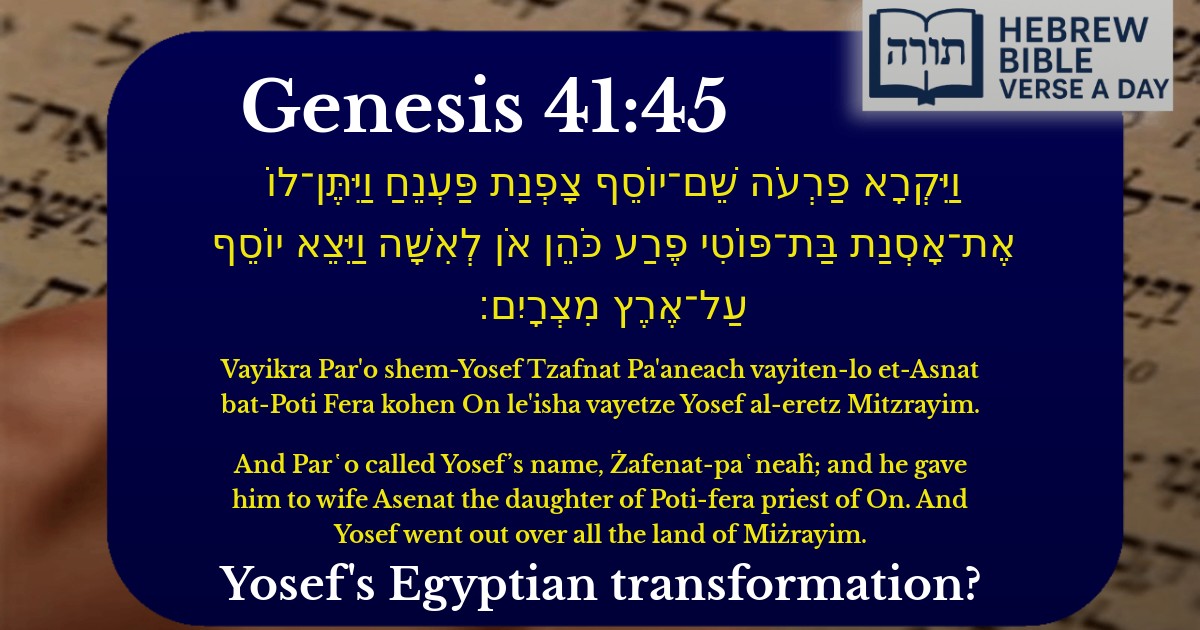Join Our Newsletter To Be Informed When New Videos Are Posted
Join the thousands of fellow Studends who rely on our videos to learn how to read the bible in Hebrew for free!
Hebrew Text
וַיִּקְרָא פַרְעֹה שֵׁם־יוֹסֵף צָפְנַת פַּעְנֵחַ וַיִּתֶּן־לוֹ אֶת־אָסְנַת בַּת־פּוֹטִי פֶרַע כֹּהֵן אֹן לְאִשָּׁה וַיֵּצֵא יוֹסֵף עַל־אֶרֶץ מִצְרָיִם׃
English Translation
And Par῾o called Yosef’s name, Żafenat-pa῾neaĥ; and he gave him to wife Asenat the daughter of Poti-fera priest of On. And Yosef went out over all the land of Miżrayim.
Transliteration
Vayikra Par'o shem-Yosef Tzafnat Pa'aneach vayiten-lo et-Asnat bat-Poti Fera kohen On le'isha vayetze Yosef al-eretz Mitzrayim.
Hebrew Leining Text
וַיִּקְרָ֨א פַרְעֹ֣ה שֵׁם־יוֹסֵף֮ צָֽפְנַ֣ת פַּעְנֵ֒חַ֒ וַיִּתֶּן־ל֣וֹ אֶת־אָֽסְנַ֗ת בַּת־פּ֥וֹטִי פֶ֛רַע<sup class="footnote-marker">*</sup><i class="footnote">(בספרי תימן פּֽוֹטִיפֶ֛רַע בתיבה אחת)</i> כֹּהֵ֥ן אֹ֖ן לְאִשָּׁ֑ה וַיֵּצֵ֥א יוֹסֵ֖ף עַל־אֶ֥רֶץ מִצְרָֽיִם׃
וַיִּקְרָ֨א פַרְעֹ֣ה שֵׁם־יוֹסֵף֮ צָֽפְנַ֣ת פַּעְנֵ֒חַ֒ וַיִּתֶּן־ל֣וֹ אֶת־אָֽסְנַ֗ת בַּת־פּ֥וֹטִי פֶ֛רַע*(בספרי תימן פּֽוֹטִיפֶ֛רַע בתיבה אחת) כֹּהֵ֥ן אֹ֖ן לְאִשָּׁ֑ה וַיֵּצֵ֥א יוֹסֵ֖ף עַל־אֶ֥רֶץ מִצְרָֽיִם׃
🎵 Listen to leining
Parasha Commentary
📚 Talmud Citations
This verse is quoted in the Talmud.
📖 Sotah 36b
The verse is referenced in the discussion about Joseph's rise to power in Egypt and the significance of his Egyptian name, Zaphnath-Paaneah.


The Meaning of Yosef's Egyptian Name: Tzáfenat Páaneach
Rashi explains that Pharaoh gave Yosef the name Tzáfenat Páaneach (צָפְנַת פַּעְנֵחַ) because it means "the one who explains hidden things" (מגלה טמונות), reflecting Yosef's divine gift of interpreting dreams. The Midrash (Bereshit Rabbah 90:4) offers additional interpretations:
Yosef's Marriage to Asenat
Pharaoh gave Yosef Asenat, the daughter of Poti-Fera, as a wife. Rashi notes that Poti-Fera is the same as Potiphar (פוטיפר), Yosef's former master, whose name changed after being castrated (סריס) by angels when he sought to sin with Yosef (based on Bereshit Rabbah 86:3). The Talmud (Sotah 13b) states that Asenat was actually the daughter of Dina, conceived through Shechem, but raised by Potiphar's wife—thus preserving Yosef's lineage within Klal Yisrael.
Yosef's Leadership in Egypt
The verse concludes that "Yosef went out over all the land of Egypt", indicating his authority. Rambam (Hilchot Melachim 1:7) derives from this that a Jewish leader appointed by a non-Jewish king has valid authority, provided the people accept him. The Kli Yakar adds that Yosef's "going out" symbolizes his transition from prisoner to ruler, fulfilling his earlier dreams of leadership (Bereshit 37:5-11).